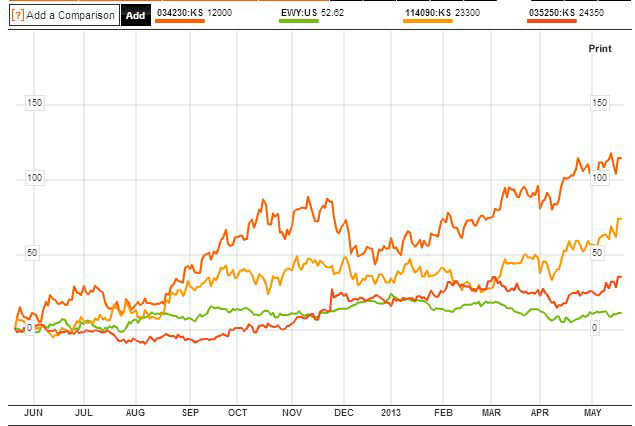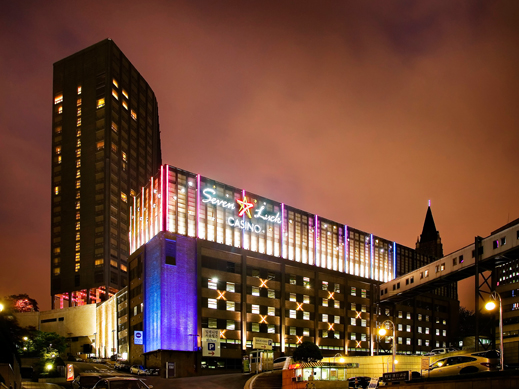As I noted last week in covering two casino operators in Cambodia, there’s more to Asia than just Macau. Countries across Southeast Asia, from Singapore to Vietnam to the Philippines are building gambling operations ranging from slot halls to multi-billion dollar integrated resorts to target not just the coveted Chinese VIP customer, but gamblers from across the region.
One of those countries is Korea, who currently sports 17 casinos (with more likely on the way). Last year I profiled three stocks in the country, recommending the two companies that operate the foreigner-only casinos: Grand Korea Leisure (114090.KS) and Paradise Group (034230.KS). And indeed, both stocks have soared over the past year, outperforming both the Korean stock market as a whole and locals-only operator Kangwon Land Casino (035250.KS):

one-year chart showing percentage gains for Paradise Group (dark orange), Grand Korea Leisure (dark yellow), Kangwon Land (red), iShares South Korea Index Fund ETF (EWY); chart courtesy bloomberg.com
 The gains at GKL and, in particular, Paradise Group, are remarkable – and worrisome. Paradise has better than doubled over the last year, and now trades at rather high valuations. At roughly 23 times 2013 earnings estimates, and 17.5x 2014 earnings estimates, the company’s multiples are approaching those of Macau operators such as Melco Crown Entertainment (MPEL) and Las Vegas Sands (LVS). Yet Paradise’s properties in Seoul and the island of Jeju largely target the same Chinese VIPs as their competitors in Macau. According to analysts at Barclays,nearly half of the table drop at the company’s Paradise Walker Hill property in Seoul comes from Chinese VIP customers; that segment accounts for nearly 90% of the drop in Jeju. Paradise will be adding operations in Incheon this summer (they are buying the license from their parent company); in 2012, 70% of the table drop in Incheon came from Chinese VIPs, again according to Barclays. As such, valuing Paradise near the same levels as dominant, diversified operators such as LVS and Melco Crown – given the overlapping of their target demographics and the multinational operators’ traditional success in targeting those customers – seems a bit optimistic.
The gains at GKL and, in particular, Paradise Group, are remarkable – and worrisome. Paradise has better than doubled over the last year, and now trades at rather high valuations. At roughly 23 times 2013 earnings estimates, and 17.5x 2014 earnings estimates, the company’s multiples are approaching those of Macau operators such as Melco Crown Entertainment (MPEL) and Las Vegas Sands (LVS). Yet Paradise’s properties in Seoul and the island of Jeju largely target the same Chinese VIPs as their competitors in Macau. According to analysts at Barclays,nearly half of the table drop at the company’s Paradise Walker Hill property in Seoul comes from Chinese VIP customers; that segment accounts for nearly 90% of the drop in Jeju. Paradise will be adding operations in Incheon this summer (they are buying the license from their parent company); in 2012, 70% of the table drop in Incheon came from Chinese VIPs, again according to Barclays. As such, valuing Paradise near the same levels as dominant, diversified operators such as LVS and Melco Crown – given the overlapping of their target demographics and the multinational operators’ traditional success in targeting those customers – seems a bit optimistic.
In response, analysts defend the company’s premium multiple by pointing to its past success, and arguing, as Thomas Bae of Woori Investments and Securities wrote, that the company’s “multi-year growth story remains intact.” The purchase of an additional stake in the Incheon operations will consolidate that property’s earnings to Paradise’s bottom line, boosting reported profits; the Walker Hill property will undergo an expansion in 2014 (though analysts at Barclays have predicted the expansion will not be completed until the following year); additional licenses are expected to be “injected” from the parent company in 2015. Those additional licenses include another operation in Jeju, an island off the southern coast. It was Jeju that provided a huge boost to growth in 2012, with gambling revenue at Paradise’s property there rising a stunning 69 percent year over year; the addition of a second property there to Paradise’s consolidated results will likely boost profits in 2015 and 2016. By then, an integrated resort planned for Incheon is set to open. All told, Paradise appears set to have specific, beneficial earnings drivers in each of the next four years.
That’s the good news. But there are some risks. For one, investors are paying for those higher earnings already, through the higher stock price and significantly higher earnings multiple. (As a frame of reference, Paradise’s P/E ratio was closer to 12 when I first covered the stock last March.) There are also broader, long-term risks. The company’s Incheon resort will be the first in the area, but it seems highly unlikely to be the last. The country created “free enterprise zones” as part of the ambitious 8City development in the coastal city, allowing foreign investors to potentially enter the market. Already, multinational players such as Japan’s Universal Entertainment, Genting, and Caesars Entertainment (CZR) have expressed interest in the area.
To be fair, any additional development would likely not be open until the end of the decade, giving Paradise a significant head start. But competitive fears abound for Paradise shareholders. As Barclays analyst Seyon Park noted in an otherwise bullish report, the liberalization of the Japanese market could have a negative long-term impact on the Korean market as well. While admitting that a casino would likely not open in Japan until 2020, Park wrote that “we believe the increased uncertainty would have negative implications for Paradise share price [sic].” Japanese visitors – though surpassed in importance by Chinese VIPs – still make up a substantial share of revenue for Korean casinos; 25 percent of Paradise’s VIP drop came from Japanese visitors in 2012, according to Barclays.
Similar fears would likely arise in the case of foreign movement into the Korean market, particularly in major cities Incheon and Seoul. The problem for the Korean operators is that they are simply ill-equipped to handle dominant, experienced, multi-national competitors. According to a report in the Macau Daily Times, consultant Steve Park told a forum at G2E Asia last year that “the local (Korean) operators are generally regarded as lacking transparency in their operations, [and having] inefficient management…they need to get rid of their dark-side image first.” A few days later, in an interview with the paper, Park added that the Korean operators simply did not perform “to the standards of Macau, Singapore, or Las Vegas.” As development continues elsewhere in Southeast Asia – and as capacity increases in existing markets – Paradise will have to rise to its competition, particularly to maintain its growth rate among the lucrative Chinese VIPs. It’s not necessarily clear that, even with the Incheon IR opening in 2016, that they will be able to do so.
The reliance on Chinese and Japanese customers is due to the country’s ban on citizens entering casinos, save for the Kangwon Land property in an isolated, mountainous region. There have been multiple efforts made to repeal the ban – which would provide a massive revenue and profit boost to both Paradise and GKL – but it remains unlikely the government will change its stance. In January, South Korean director of tourism Kim Jin-Gon told Agence France-Presse, “Our feeling is that Korea does not have a mature culture that could enjoy gambling simply as a leisure activity. We block Koreans from casinos because the fallout would be too big,” later adding that “if we let Koreans in, there would be no room left for foreigners.” (It should be noted that foreign investment in Korean properties has often been reported as being predicated on a removal or a lessening of the ban on locals; as such, the persistence of the ban could lessen the foreign competition posed by Caesars, Genting, and others.)
There is of course, another key risk facing South Korean casinos, and that is North Korean leader Kim Jong-un. If you look at the chart above, you will notice that the broad Korean market has declined relatively sharply since the beginning of the year; it has, in fact, dropped over 10 percent year-to-date. Much of the drop has come from concerns about North Korea’s incessant sabre-rattling at its neighbor; that belligerent activity continued this weekend, with the Hermit Kingdom testing short-range missiles. Any political turmoil could affect the South Korean economy, and given how closely correlated gambling stocks are with economic fears, stocks such as Paradise, GKL, and Kangwon Land would likely take a hit if the current climate escalates to any sort of military confrontation.
With so many varied risks, and no real evidence that the Korean operators have the same level of experience or expertise in the casino business as their regional – and potentially in-country – competitors, Paradise’s current valuation simply seems too pricy after better than doubling over the past year. GKL offers a more modest multiple, but lower earnings growth and less explosive locations; meanwhile, the larger risks facing Paradise apply equally to that stock, which has itself doubled since the beginning of 2012.
Kangwon Land, meanwhile, has not seen the share price growth of its foreigner-only peers; but nor has it seen the earnings growth. Net income declined more than 25 percent from 2010 to 2012, while revenue was largely flat. The casino has been allowed by the state to expand its operations, with the number of table games and slot machines each rising by over 50 percent. HI Investment Securities analyst Min Young-sang expects net profits to rise 30 to 40 percent once the expansion is complete.
However, such gains would still put the company’s earnings multiple around 16-18 (down from its current level of 22), and it’s not necessarily clear that the expansion would provide long-term growth once additional capacity is installed. Meanwhile, the property is designed by the state largely to fund the development of the its province, meaning shareholders are simply not the first priority of management. The company is largely dependent on politicians; any additional domestic license would be a boon for GKL and Paradise, but a disaster for Kangwon Land, which according to Inside Asian Gaming is a four hour drive from Seoul along a “difficult road.” Meanwhile, a 2012 profile of the High 1 resort complex – which includes Kangwon Land – by the Korea Times noted that the resort was attempted to double visitation to 10 million by 2020. But the same report also pointed out that the casino’s very existence was made possible by a special law that expired in 2025. (A 2011 report from Inside Asian Gaming claimed that Kangwon Land’s license would expire in 2015, according to sources, but this report cannot be independently verified elsewhere.) The KT article noted Kangwon Land’s attempts to diversify into other attractions – such as a golf course and a shopping mall – to “minimize the shock” to the company should the law expire or an additional domestic license be granted. “It’s hard to predict right now whether or not the law will be extended,” a Kangwon Land spokesperson told the Times.
It’s hard to predict anything right now in Korea: how the political situation will turn out, whether or not foreign investors will enter the market, whether or not locals will be granted entry to casinos beyond a single, relatively inaccessible location in the mountains of an impoverished province. That’s often true of stocks, and usually true of stocks in emerging markets like South Korea. The problem right now is that the price paid to enter that market is much higher than it has been; right now, the risks seem to make those prices simply too high.
